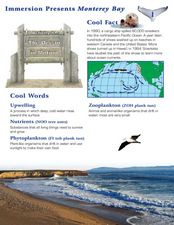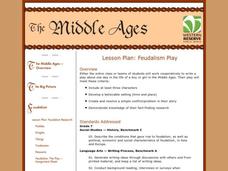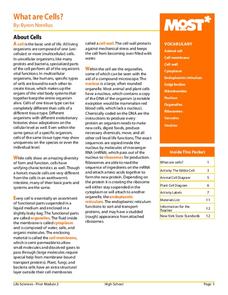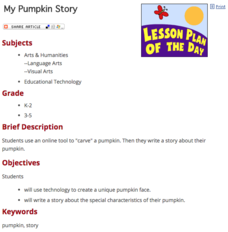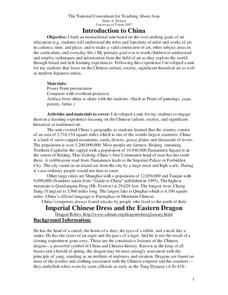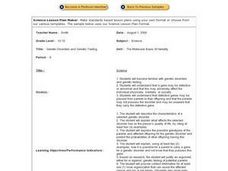Curated OER
Monterey Bay
Students read background information about Monterey Bay, California, and conduct related experiments. In this ocean in motion lesson plan, students read information about the location, wildlife, and characteristics of Monterey Bay. They...
NET Foundation for Television
1850-1874 Notable Nebraskan: J. Sterling Morton
What are the characteristics of an outstanding citizen? Nebraskan J. Sterling Morton contributed to the formation of societal and family values in his state. Learners gather information on Morton's life accomplishments from primary...
Scholastic
Biographical History
Elementary learners study and research an important historical figure. They research a historical figure and use a four square organizer to take notes. They develop a timeline and poem that reflects the life of the historical figure....
Sargent Art
Picasso and Beyond!
After reviewing the life and art of Pablo Picasso, learners set out to create abstract, cubist, relief portraits. They'll draw, color, paint, and cut out portraits just like the ones Picasso created. The lesson is extremely well written...
Northeastern Educational Television of Ohio, Inc.
Feudalism Play
Using research notes on feudal roles in medieval Europe, learners work cooperatively to write a play about one day in the life of a boy or girl in the Middle Ages.
Curated OER
What Are Cells?
Energize the cells of young biologists with an edible life science activity. Engaging learners in exploring the inner workings of plant and animal cells, this activity involves using colored jello and various sweet and tasty treats to...
Curated OER
Steer Clear of Trouble
Inform teenagers about safe driving techniques. Young journalists use the Internet to investigate safe driving practices and technologies then publish a manual for the teen drivers in their life.
Curated OER
Human Evolution: Biology, Bones
Learners will love a weeks worth of bone study. They use bones and characteristics of bones to explore the evolution of hominoids. Bones are compared, categorized, and considered. A great way to bring physical anthropology and material...
Curated OER
Stream Scanners
Students investigate quality of water in a stream, lake, or pond by examining chemical, physical, and biological characteristics.
Curated OER
Earth's Heavenly Treasures: Hummingbirds
Young ornithologists watch an informative video and use the Internet to gather data about the life, size, habitat, and migration of hummingbirds. The interdisciplinary lesson includes activities that target art, science, math, and...
Curated OER
Fate vs. Mind: A Macedonian Folk Tale
Young scholars read examples of folk tales and describe the characteristics of fables and folk tales. They also examine the concept of fate and if it plays a part in people's lives.
Ocean Explorer
Architects of the Coral Reef
Coral Reefs are the focus of a life science lesson plan. Upper graders look at how coral reefs are formed, how the animals and plants reproduce, and the variety of ways that humans benefit from coral reefs around the world. Groups of...
Education World
My Pumpkin Story
Have young pumpkin carvers use technology to create a unique pumpkin face and write a short story about the special characteristics of their pumpkin.
Curated OER
Student Reading - The Unique Properties of Water
Without water there would be no life on this planet. Biology learners find out why by reading this handout. Create a worksheet of questions to answer after the reading. Follow it up with quick demonstrations or laboratory activities that...
Curated OER
Invetories Slave owner or not?
Primary source analysis is a great way to bring history to life. Learners examine a series of personal inventories taken from Southern white males who died during the Civil War era. They analyze the documents to determine the social and...
Curated OER
Help the Duck Find Her Babies
Students are introduced to a basic characteristic and need of living things-the ability and need to reproduce. They investigate how birds (and people) attract mates. Students discover how to build a nest. They discuss the needs and...
Curated OER
Living-Nonliving
Students determine that environments have living and nonliving parts. They discuss what makes something a living thing and something a nonliving thing. They make a chart and list characteristics of living things and nonliving things.
Curated OER
Introduction to China
Compare and contrast the distinctive characteristics of art forms from various cultural, historical, and social contexts, and describe how the same subject matter is represented differently in works of art across cultures and time...
Curated OER
Ecology and the Biosphere
Ecology enthusiasts explore ecosystems with this activity. They define vocabulary terms and write out answers to questions about distribution and abundance of life. They complete a chart comparing abiotic and biotic factors of Earth's...
Curated OER
Changing Planet: Fading Corals
Show the six-minute video, "Changing Planet: Fading Corals," and then demonstrate how calcium carbonate forms a precipitate in the presence of carbon dioxide. Separate your scientists into small groups to gather information about coral...
Curated OER
Genetic Disorder and Genetic Testing
Sixth graders explore the characteristics of a selected genetic disorder and research relevant information to justify an argument either for or against genetic testing. Your class can work in groups to gather specific information in...
Curated OER
Chilean Sea Bass
Introduce your mini-marine biologists to using databases. Tables of how many Chilean Sea Bass were caught and number of hours spent fishing are examined. Using the data, individuals calculate the "Catch per Unit of Effort" for each year....
Indiana University
Literature of Asia and the Middle East: "A Sound of Hammering" by Dazai Osamu
Dazai Osamu’s short story, “A Sound of Hammering” is the focus of a three-day investigation of modern Japanese literature and life in post-World War II Japan. The events in Osamu’s story mirror those in his own life, and give a...
Curated OER
What Kind of Vessel Are You?
This is a strange question; but what kind of vessel would you be and why? After examining images of a large Inca jug, the class sets to writing a creative narrative that answers that very interesting question. They start by researching...
Other popular searches
- 6 Characteristics of Life
- 7 Characteristics of Life
- The Characteristics of Life
- Characteristics of Life Labs
- Life Characteristics
- Life Characteristics Biology
- Basic Characteristics of Life


